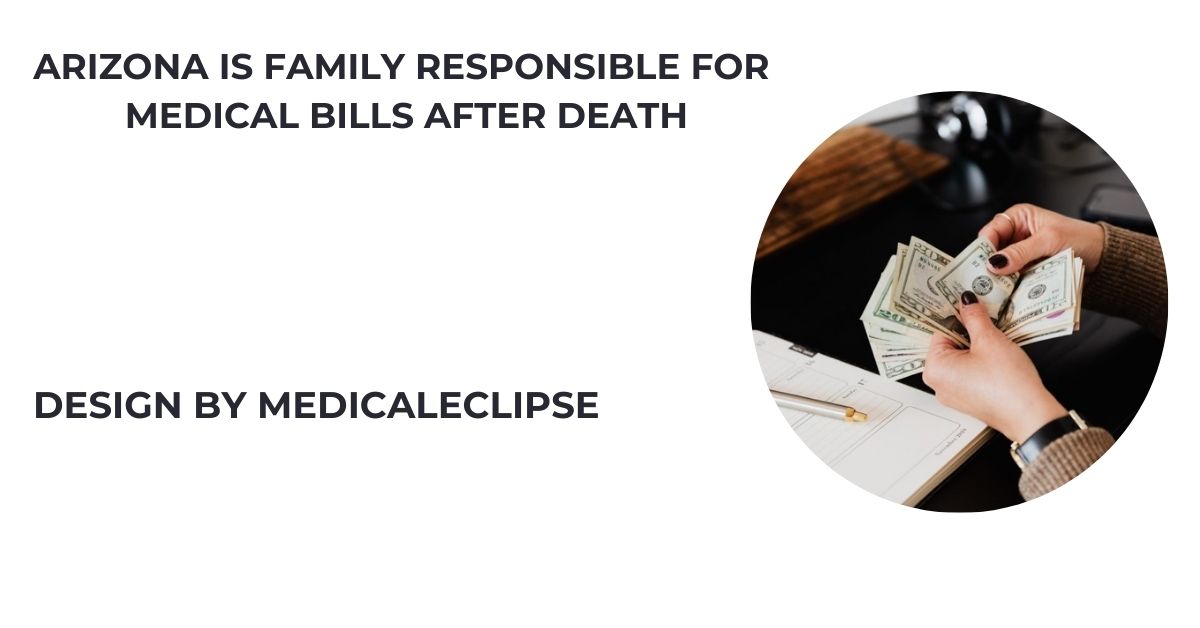In Arizona, medical bills after death are generally paid from the deceased’s estate. Family members are not personally responsible unless they co-signed or agreed to pay.
In this article, we’ll explore the important question: “Is the family responsible for medical bills after a loved one’s death in Arizona?” Understanding your rights and obligations can help navigate this challenging time with clarity and peace of mind.
Who is Responsible for Medical Bills After Death in Arizona?

In Arizona, the estate of the deceased is primarily responsible for settling any outstanding medical bills. An estate consists of all the assets owned by the deceased at the time of their death, including:
- Bank accounts
- Real estate
- Investments
- Personal property
These assets are used to pay off debts, including medical bills, through a legal process called probate. Once the estate’s debts are settled, any remaining assets are distributed to the heirs or beneficiaries. This process ensures that creditors are paid in a fair and organized manner, but it also means that the estate must be adequately managed to avoid unnecessary complications.
Are Family Members Responsible for Medical Debt?
Generally, family members are not personally responsible for a deceased individual’s medical bills in Arizona. However, there are exceptions:
Spousal Responsibility:
Arizona’s community property laws mean that both spouses share financial obligations for debts incurred during the marriage. Medical debts, even if only one spouse received care, may be treated as a shared responsibility. After death, creditors may seek payment from the surviving spouse if the estate cannot cover the debt. Understanding this can help avoid unexpected financial burdens.
Co-Signed Agreements:
When a family member co-signs a medical or financial agreement, they agree to take on full responsibility for the debt if the primary borrower cannot pay. This includes situations where the borrower has passed away, leaving the co-signer liable. It’s essential to carefully review any co-signing agreements to understand potential long-term obligations.
Parental Responsibility:
Parents may be responsible for covering the medical expenses of a minor child who has passed away, particularly when the child’s estate is insufficient to settle the debt. This responsibility may be limited to debts directly related to the child’s care. Seeking legal advice can clarify obligations and explore possible protections under Arizona law.
Also Read: What Orthotics Are Covered By Medicaid In Utah – What You Need to Know About Orthotics Coverage!
What Happens if the Estate Cannot Cover Medical Bills?
If the deceased’s estate lacks sufficient assets to cover the medical bills, the debts are typically written off. Creditors cannot pursue family members for unpaid debts unless one of the exceptions mentioned above applies. It is important to note that creditors may attempt to collect from family members, but understanding your legal rights can help you avoid paying debts that are not your responsibility.
How Does Probate Work in Arizona?
The probate process ensures that the deceased’s debts, including medical bills, are settled before assets are distributed to heirs. Here’s how it works:
- Appointment of a Personal Representative: The court appoints a personal representative (executor) to manage the estate. This individual is responsible for ensuring that all legal and financial obligations are met.
- Inventory of Assets: The representative identifies and values all assets in the estate. This includes tangible assets like property and vehicles as well as intangible ones like stocks and bank accounts.
- Notification of Creditors: Creditors are notified of the death and given an opportunity to submit claims for payment. There is a specific timeframe within which creditors must file claims.
- Payment of Debts: The representative pays off debts, including medical bills, using the estate’s assets. Priority is given to certain debts, such as funeral expenses and taxes.
- Distribution of Remaining Assets: Once debts are cleared, the remaining assets are distributed to beneficiaries according to the will or state intestacy laws if no will exists.
Steps to Protect Yourself from Unexpected Liability:

To avoid unexpected financial responsibilities, consider the following steps:
Understand the Deceased’s Financial Situation:
Start by reviewing the deceased’s financial documents, including bank accounts, insurance policies, and outstanding debts. This will help you determine if there are enough assets in the estate to cover liabilities. Identifying co-signed agreements or joint debts early can prevent unexpected financial surprises later.
Seek Legal Advice:
Consulting with an estate attorney can clarify your obligations and help ensure creditors follow the law during debt collection. They can also assist in protecting any exempt assets, such as retirement accounts or personal property. Early legal guidance can save time, money, and stress as you navigate probate or debt-related disputes.
Avoid Co-Signing:
Co-signing agreements may seem helpful but can create long-term financial risks if the primary borrower defaults or passes away. Before agreeing to co-sign, explore options such as offering non-binding financial support. Educating yourself about the consequences of co-signing can prevent unintended liabilities.
Encourage Estate Planning:
Estate planning ensures a clear distribution of assets and avoids unnecessary legal complications for loved ones. Encourage family members to establish durable powers of attorney, designate beneficiaries, and consider long-term care insurance. Proactive planning can reduce the emotional and financial burden on survivors.
Understanding Community Property in Arizona:
As a community property state, Arizona’s laws can impact how medical debts are handled after death. Debts incurred during the marriage are generally considered community debts, meaning both spouses are equally responsible. However, debts incurred before the marriage or solely in one spouse’s name may not be the responsibility of the surviving spouse. It’s essential to consult with an attorney to determine how these laws apply to your specific situation.
Also Read: Nkda Medical Abbreviation – NKDA in Medical Records!
Dealing with Aggressive Creditors:
Sometimes, creditors may aggressively pursue family members for unpaid medical debts. To protect yourself:
- Request Documentation: Ask for proof of the debt and verify whether you are legally obligated to pay.
- Know Your Rights: Familiarize yourself with Arizona’s debt collection laws and seek legal help if necessary.
- Communicate Through the Estate: Redirect creditors to the estate’s personal representative to ensure proper handling.
The Role of Medicaid Estate Recovery:
If the deceased received Medicaid benefits, Arizona’s Medicaid program may seek repayment through the estate. This process, known as Medicaid Estate Recovery, typically applies to medical expenses covered for individuals over 55. However, certain exemptions exist, such as when there is a surviving spouse or minor children. It’s important to understand how Medicaid recovery rules may affect the estate’s assets.
FAQ’s
1. Who pays medical bills after death in Arizona?
The deceased’s estate typically covers medical bills through the probate process.
2. Are family members responsible for unpaid medical debts?
No, unless they co-signed or the debt falls under spousal community property laws.
3. What happens if the estate lacks assets?
Creditors usually write off the debt unless exceptions like co-signing apply.
4. How does community property affect medical bills?
In Arizona, spouses may share responsibility for debts incurred during the marriage.
5. Can creditors pursue family members aggressively?
Family members should know their rights and redirect creditors to the estate’s representative.
Conclusion
In Arizona, medical bills after death typically fall to the deceased’s estate, not their family. Exceptions include spousal responsibility under community property laws or co-signed agreements. Understanding probate, legal obligations, and estate planning can reduce financial stress. Seeking professional guidance helps families confidently navigate these challenges, ensuring focus on healing and honoring their loved one.

Leave a Reply